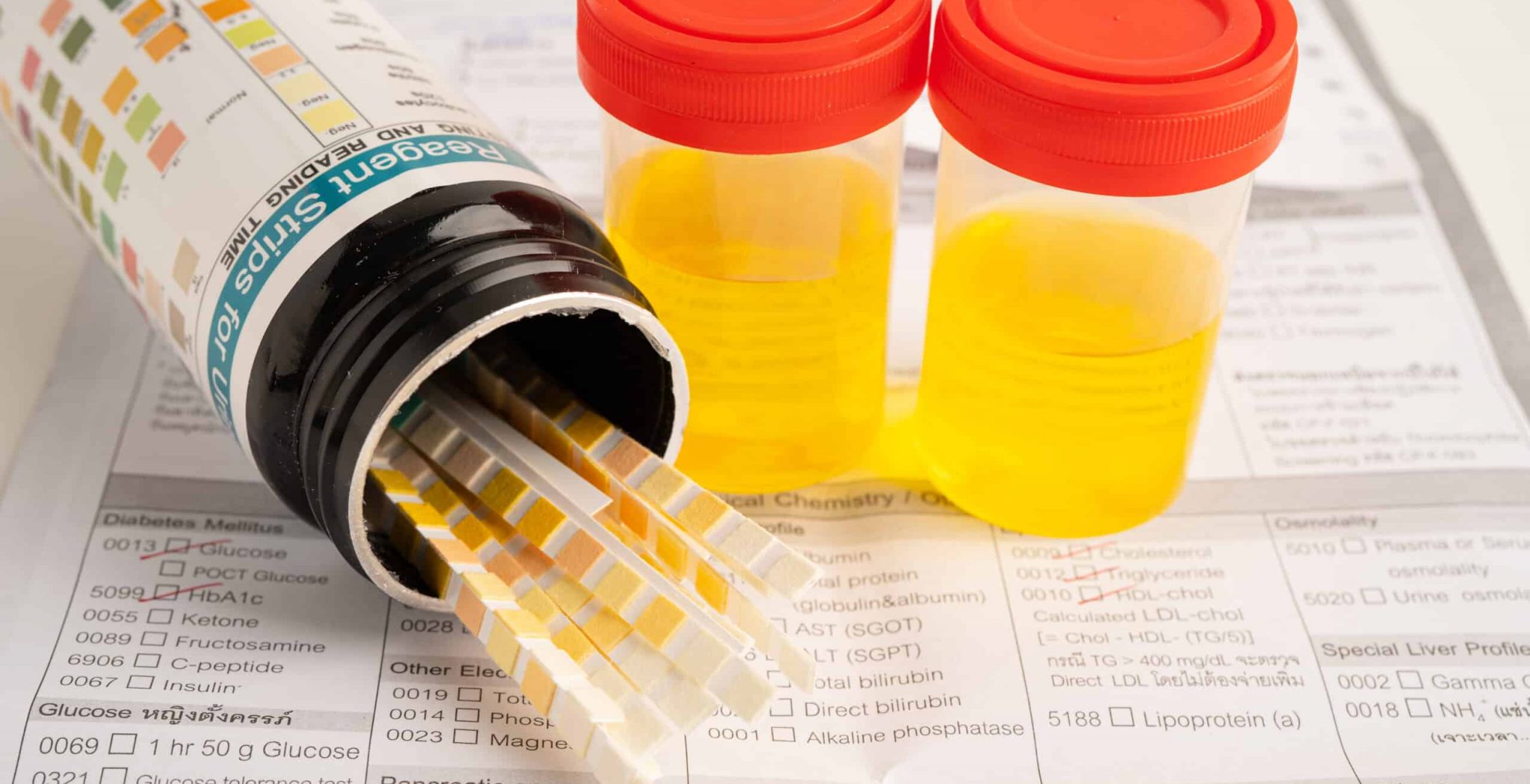If you’re concerned about Suboxone detection in your system or struggling with Suboxone dependence, understanding detection times and available treatment is crucial. While Suboxone helps treat opioid addiction, it can also lead to its own form of dependence requiring specialized care.
Need immediate help with Suboxone dependence? Contact our specialists now at (949) 284-7325 for confidential assessment and medically supervised treatment.
Quick Reference: Suboxone Detection Times
| Test Type | Detection Window | Accuracy | Common Uses |
|---|---|---|---|
| Urine Test | 5–8 days (up to 14 days) | Very High | Most common testing method |
| Blood Test | 2–7 days after use | Very High | Medical emergencies, legal cases |
| Saliva Test | 1–7 days after use | High | Roadside testing, workplace screening |
| Hair Follicle Test | Up to 90 days (3 months) | High | Long-term use detection |
Suboxone has a long half-life (24-42 hours), making detection times longer than many other medications.
⚠️ MEDICAL WARNING: Never stop Suboxone suddenly without medical supervision. Abrupt discontinuation can cause severe withdrawal symptoms and increase overdose risk if returning to opioid use.
Understanding Suboxone: Medication vs. Dependence
Suboxone is an FDA-approved medication containing two active ingredients designed to treat opioid use disorder while minimizing abuse potential.
What Makes Suboxone Unique
Active ingredients:
- Buprenorphine – Partial opioid agonist providing controlled relief
- Naloxone – Opioid antagonist preventing misuse through injection
How it works:
- Reduces cravings for stronger opioids
- Prevents withdrawal symptoms during recovery
- Blocks euphoric effects from other opioids
- Has “ceiling effect” reducing overdose risk
Medical Forms and Administration
Available forms:
- Sublingual strips (most common) – dissolve under tongue
- Sublingual tablets – dissolve under tongue
- Buccal film – applied to inside of cheek
Proper medical use:
- Prescribed as part of medication-assisted treatment (MAT)
- Requires medical supervision and monitoring
- Used in conjunction with counseling and therapy
- Typically initiated 6+ hours after last opioid use
Learn about our comprehensive treatment programs designed for safe, effective recovery.
Suboxone Half-Life and Elimination
Understanding Suboxone Metabolism
Suboxone half-life: 24-42 hours (much longer than most medications)
Complete elimination timeline:
- Healthy individuals: 5-8 days
- Liver complications: 7-14 days
- Chronic users: Up to 2+ weeks
Factors Affecting Elimination
Individual biological factors:
- Liver function (primary metabolism site)
- Age (older adults eliminate slower)
- Body weight and composition
- Overall health status
Usage factors:
- Dose amount and frequency
- Duration of treatment
- Method of administration
- Concurrent medications
Detailed Detection Windows by Test Type
Urine Testing (Most Common)
Detection window: 5-8 days for healthy individuals, up to 14 days with complications
Factors extending detection:
- Liver disease or dysfunction
- Higher doses or long-term use
- Kidney problems affecting elimination
- Dehydration concentrating metabolites
Blood Testing (Medical/Legal Use)
Detection window: 2-7 days after last dose
When blood tests are used:
- Medical emergencies and treatment monitoring
- Legal investigations requiring precise timing
- Determining recent compliance with treatment
Saliva Testing (Convenient Screening)
Detection window: 1-7 days after last use
Advantages:
- Non-invasive and quick results
- Good for recent use detection
- Used for compliance monitoring
Hair Follicle Testing (Long-term Detection)
Detection window: Up to 90 days (3 months)
Key characteristics:
- Shows pattern of use over months
- Cannot detect very recent use (last 5-7 days)
- Most expensive testing method
- Used for long-term treatment monitoring
Recognizing Suboxone Misuse and Dependence
Signs of Suboxone Abuse
Physical indicators:
- Sedation and drowsiness beyond therapeutic effects
- Slowed breathing (respiratory depression)
- Pinpoint pupils
- Poor coordination
Behavioral warning signs:
- Taking higher doses than prescribed
- Using non-prescribed routes (snorting, injecting)
- Obtaining from multiple sources
- Continuing use after treatment completion
Suboxone Dependence vs. Addiction
Physical dependence (normal with legitimate use):
- Body adapts to regular medication presence
- Withdrawal occurs if stopped suddenly
- Can occur even with proper medical use
- Managed through medical tapering
Suboxone addiction/abuse:
- Compulsive use despite negative consequences
- Craving and loss of control
- Social/occupational impairment
- Risky behaviors to obtain drug
If you recognize these signs, professional assessment can help determine the best treatment approach.
The Challenge of Suboxone Withdrawal
Why Medical Supervision Is Essential
Suboxone withdrawal risks:
- Severe psychological symptoms including depression and anxiety
- Extended withdrawal timeline (weeks to months)
- High relapse risk to stronger opioids
- Potential for overdose if returning to street drugs
Suboxone Withdrawal Timeline
Days 1-3:
- Anxiety and agitation
- Muscle aches and bone pain
- Sleep disturbances
- Mood changes
Days 4-14:
- Peak withdrawal intensity
- Depression and mood swings
- Cravings for opioids
- Physical discomfort
Weeks 2-8:
- Gradual symptom improvement
- Persistent depression and anxiety
- Sleep pattern disruption
- Ongoing cravings
Safe Tapering Process
Medical tapering involves:
- Gradual dose reduction over months
- Regular medical monitoring
- Psychological support throughout process
- Relapse prevention planning
- Alternative treatment options if needed
Our medically supervised detox program provides safe, comfortable withdrawal management.
Comprehensive Suboxone Treatment at SoCal Sunrise
Whether you’re struggling with Suboxone dependence or need proper medication-assisted treatment, our evidence-based programs provide comprehensive care for lasting recovery.
Our Proven Treatment Programs
Medical Assessment and Evaluation
Comprehensive intake process:
- Complete medical history and physical examination
- Addiction severity assessment using standardized tools
- Mental health evaluation for co-occurring disorders
- Treatment planning based on individual needs
Medically Supervised Detox
Safe withdrawal management:
- 24/7 medical monitoring by healthcare professionals
- Gradual tapering protocols to minimize withdrawal
- Comfort medications for symptom management
- Psychological support during vulnerable period
Residential Treatment Program
Intensive therapeutic intervention:
- Individual therapy sessions addressing underlying issues
- Group therapy with peers facing similar challenges
- Family therapy and education programs
- Comprehensive addiction education and relapse prevention
Evidence-Based Therapeutic Approaches
Cognitive Behavioral Therapy (CBT)
- Identifying triggers and high-risk situations
- Developing healthy coping strategies
- Building relapse prevention skills
- Addressing negative thought patterns
Dialectical Behavior Therapy (DBT)
- Emotional regulation techniques
- Distress tolerance skills
- Mindfulness practices
- Interpersonal effectiveness training
Group Therapy
- Peer support and accountability
- Shared experiences and learning
- Building healthy social connections
- Practicing communication skills
Family Therapy
- Healing damaged relationships
- Education about medication-assisted treatment
- Communication skills training
- Support for family members
Holistic Treatment Approaches
Complementary therapies:
- Yoga therapy and fitness programs
- Guided meditation and mindfulness training
- Creative arts therapy
- Nutritional counseling
Learn more about our complete holistic treatment approach.
Specialized Support Services
Dual Diagnosis Treatment
Many individuals on Suboxone have co-occurring conditions such as depression and anxiety disorders, PTSD and trauma, chronic pain management, and other mental health conditions.
Medication-Assisted Treatment (MAT) Optimization
- Proper Suboxone dosing and monitoring
- Alternative MAT options when appropriate
- Long-term maintenance planning
- Transition planning for tapering
Insurance Coverage and Treatment Access
Don’t let financial concerns prevent you from getting proper treatment. We work with most major insurance providers to ensure access to care.
Insurance Plans We Accept:
- Cigna – Comprehensive coverage options
- Aetna – Full range of treatment services
- First Health – Network provider benefits
- ComPsych – Employee assistance programs
- Humana – Medicare and private plans
Contact our admissions team at (949) 284-7325 for confidential insurance verification and immediate admission support.
Frequently Asked Questions
Q: How long does Suboxone stay in your system? A: Suboxone typically stays in your system 5-8 days for healthy individuals, up to 14 days for those with liver complications. Hair tests can detect it for up to 90 days.
Q: Is it safe to stop Suboxone on my own? A: No, never stop Suboxone suddenly. Abrupt discontinuation can cause severe withdrawal and increase overdose risk. Always work with medical professionals for safe tapering.
Q: Can I become addicted to Suboxone? A: While physical dependence is normal with legitimate use, some people do develop addiction to Suboxone, especially when misusing it or taking higher doses than prescribed.
Q: Will Suboxone show up on a drug test? A: Suboxone requires specific testing for buprenorphine. It won’t show up on basic opioid panels but will on comprehensive drug screens or specific buprenorphine tests.
Q: How long does Suboxone treatment last? A: Treatment duration varies greatly – some people need months while others require years. The goal is stability and recovery, not rushing to discontinue medication.
Take Action Today: Get the Right Treatment
Whether you need proper Suboxone treatment or help with Suboxone dependence, professional care makes all the difference in your recovery journey.
Get Professional Assessment and Care
Call us now at (949) 284-7325 for:
- Comprehensive assessment of your Suboxone use and needs
- Insurance verification and coverage information
- Immediate admission to appropriate level of care
- Safe, medically supervised treatment planning
Why Choose SoCal Sunrise for Suboxone Treatment?
- Experienced medical team specializing in medication-assisted treatment
- Comprehensive assessment and individualized treatment plans
- Safe, medically supervised detox and tapering when appropriate
- Dual diagnosis expertise treating underlying mental health conditions
- Holistic treatment approach addressing all aspects of recovery
- Insurance acceptance with most major providers
- Ongoing support and long-term recovery planning
Start Your Recovery Journey Today
Don’t let Suboxone concerns or dependence control your life. Professional treatment can help you achieve stability, whether that means optimizing your current medication or safely transitioning to medication-free recovery.
Contact us immediately at (949) 284-7325 to discuss:
- Your specific Suboxone treatment needs
- Safe tapering options if appropriate
- Insurance coverage and financial options
- Immediate admission to our programs
Additional Resources and Treatment Information
- Comprehensive Treatment Programs
- Orange County Detox Services
- Orange County Rehab
- Meet Our Treatment Team
SoCal Sunrise Recovery Center | Licensed and accredited treatment facility | 25481 Gloriosa Dr, Mission Viejo, CA 92691 | (949) 284-7325
Remember: Suboxone can be both a life-saving medication and a substance requiring careful management. With proper medical supervision and comprehensive treatment, you can achieve your recovery goals safely and effectively.






